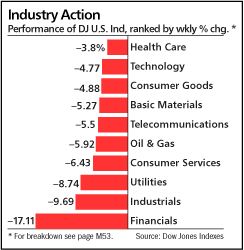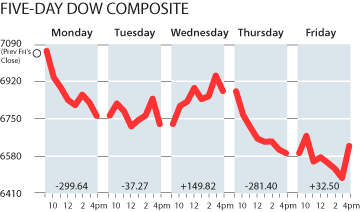
FEW STATES HAVE ESCAPED THE RECESSION; the nonprofit Center on Budget and Policy Priorities says 41 of the 50 are facing budget shortages in fiscal 2009.
William Waitzman for Barron's
But Pennsylvania has hit upon a novel way to help close its $1.6 billion deficit for the fiscal year ending June 30. It's started to grant leases to drill for natural gas in the Marcellus Shale -- hydrocarbon-bearing rock -- that covers about two-thirds of the state, and, thanks to modern technology, is eminently reachable.
"We have phenomenally productive wells in Pennsylvania with very few dry holes," says John Hanger, acting secretary of Pennsylvania's Department of Environmental Protection.
The state raised $190 million in September by granting licenses to drill on 74,000 acres. If the legislature approves, this will plug about 11% of the 2009 deficit. But next year could see drilling revenue swell. Chesapeake Energy alone plans to drill 200 wells then, Hanger says, and 600 more the following year.
More than 20 oil and gas companies, including Cabot Oil (ticker: COG) and XTO Energy (XTO), have already invested $700 million this year to develop the Marcellus Shale, half of which is located in Pennsylvania. Prices for mineral-rights leases recently jumped to $2,100 an acre, from just $300 in February. With good reason: There's enough gas inside the Marcellus Shale to meet the entire nation's needs for an estimated 12 to 14 years. That this energy lies in Pennsylvania, rather than, say, Texas, shouldn't be a surprise. After all, Titusville, Pa., was the site of the first oil strike in the U.S., by Edwin Drake, in 1859.
William Waitzman for Barron's
But Pennsylvania has hit upon a novel way to help close its $1.6 billion deficit for the fiscal year ending June 30. It's started to grant leases to drill for natural gas in the Marcellus Shale -- hydrocarbon-bearing rock -- that covers about two-thirds of the state, and, thanks to modern technology, is eminently reachable.
"We have phenomenally productive wells in Pennsylvania with very few dry holes," says John Hanger, acting secretary of Pennsylvania's Department of Environmental Protection.
The state raised $190 million in September by granting licenses to drill on 74,000 acres. If the legislature approves, this will plug about 11% of the 2009 deficit. But next year could see drilling revenue swell. Chesapeake Energy alone plans to drill 200 wells then, Hanger says, and 600 more the following year.
More than 20 oil and gas companies, including Cabot Oil (ticker: COG) and XTO Energy (XTO), have already invested $700 million this year to develop the Marcellus Shale, half of which is located in Pennsylvania. Prices for mineral-rights leases recently jumped to $2,100 an acre, from just $300 in February. With good reason: There's enough gas inside the Marcellus Shale to meet the entire nation's needs for an estimated 12 to 14 years. That this energy lies in Pennsylvania, rather than, say, Texas, shouldn't be a surprise. After all, Titusville, Pa., was the site of the first oil strike in the U.S., by Edwin Drake, in 1859.



No comments:
Post a Comment